Sturgeon: UK faces Brexit 'lost decade'published at 18:34 BST 14 September 2016
Nicola Sturgeon says there was a real risk the UK could be facing a "lost decade" as a result of the Brexit vote.
Read MoreTheresa May and Jeremy Corbyn clash over grammar schools
The SNP's Angus Robertson presses the PM on EU work permits
Last PMQs until 12 October, after the party conferences break
Pippa Simm and Alex Hunt
Nicola Sturgeon says there was a real risk the UK could be facing a "lost decade" as a result of the Brexit vote.
Read MoreTen Minute Rule Bill
 House of Commons
House of Commons
Parliament
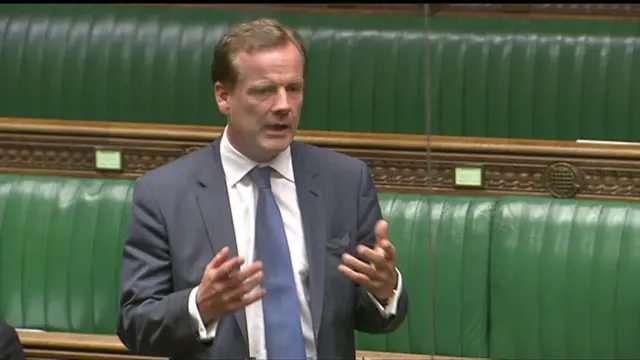
Charlie Elphicke tells MPs that while he accepts "Brexit means Brexit.. we need to get on with it".
"The sooner the better, so we have the security and stability we need to build a post-Brexit nation," he argues.
He tells MPs he has tabled today's bill to "give the House an opportunity to endorse and accept the decision of the British people" and to talk about "the red lines" and the "vision" of what Brexit should look like.
"Article 50 is a matter for the prime minister alone," he adds.
UKIP leader Nigel Farage rejects hate crime accusations
Grammar schools dominated the exchanges between Theresa May and Jeremy Corbyn, their third PMQs head-to-head.
The Labour leader criticised the government's plans to expand selection in schools in England, saying it was not fair to "segregate children" from the age of 11 and warning it would create a "second class schooling for the many".
But the PM said there was already selection by house price and, defending her plans, told MPs she wanted to see "a diversity of education provision" to ensure "opportunity for all".
Catch up with clips of some of the key moments here:
Allow X content?
This article contains content provided by X. We ask for your permission before anything is loaded, as they may be using cookies and other technologies. You may want to read X’s cookie policy, external and privacy policy, external before accepting. To view this content choose ‘accept and continue’.
Allow X content?
This article contains content provided by X. We ask for your permission before anything is loaded, as they may be using cookies and other technologies. You may want to read X’s cookie policy, external and privacy policy, external before accepting. To view this content choose ‘accept and continue’.
Allow X content?
This article contains content provided by X. We ask for your permission before anything is loaded, as they may be using cookies and other technologies. You may want to read X’s cookie policy, external and privacy policy, external before accepting. To view this content choose ‘accept and continue’.
Allow X content?
This article contains content provided by X. We ask for your permission before anything is loaded, as they may be using cookies and other technologies. You may want to read X’s cookie policy, external and privacy policy, external before accepting. To view this content choose ‘accept and continue’.
Allow X content?
This article contains content provided by X. We ask for your permission before anything is loaded, as they may be using cookies and other technologies. You may want to read X’s cookie policy, external and privacy policy, external before accepting. To view this content choose ‘accept and continue’.
You can follow the rest of the tax credits statement and the rest of the live proceedings in the Commons, Lords and also follow the day's debates in the European Parliament here.
Concentrix statement
 House of Commons
House of Commons
Parliament
Chair of the Work and Pensions Committee Frank Field says that because Concentrix was a private contract their "cutting benefit and asking questions afterwards" method was not able to be questioned by MPs.
He suggests the possibility of bringing the contract "back in house".
Jane Ellison replies that while she supports the use of private contracts she will "reflect on his wider point".
Concentrix statement
 House of Commons
House of Commons
Parliament
SNP spokesman Stewart Hosie asks how much of the claimed £300m in savings made by Concentrix "were as a result of false accusations against recipients".
He also asks how much the deploying of 150 HMRC staff to aid tax credits claimants will cost the taxpayer.
Jane Ellison says she is "not able to answer from the despatch box".
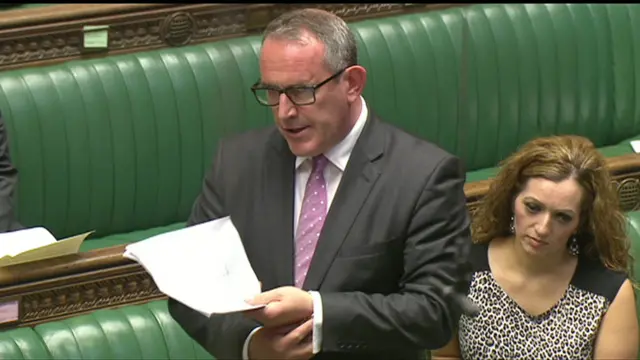
Concentrix statement
 House of Commons
House of Commons
Parliament
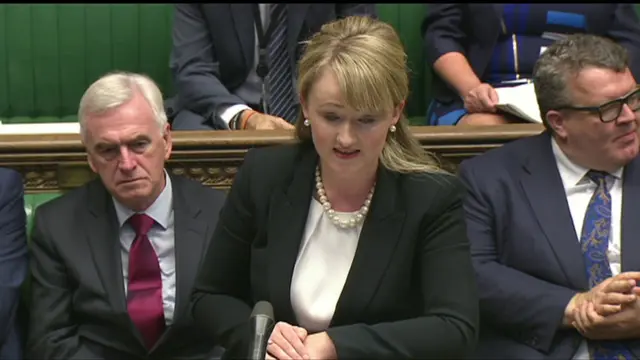
Shadow chief secretary to the Treasury Rebecca Long-Bailey says she is concerned that Concentrix will be "carrying out its services for another eight months".
"Without radical amendments to the contract service failures will continue," she argues, adding the "payment model creates a conflict of interest".
Concentrix's government contract is based on a payment-by-results model, with the "maximisation of revenue flows" as one of its key requirements - meaning it makes more money if it cuts more payments.
She calls for the government to commit to an official investigation into Concentrix conduct "so we can determine how this situation was allowed to arise".
Allow X content?
This article contains content provided by X. We ask for your permission before anything is loaded, as they may be using cookies and other technologies. You may want to read X’s cookie policy, external and privacy policy, external before accepting. To view this content choose ‘accept and continue’.
The Daily Politics puts Damian Green and Caroline Flint through their paces, with a quick test: do they know their proposed new constituency boundaries, following the boundary review?
They have a go at drawing them on a map, and it's fair to say they both do a pretty good job.
Asked for their thoughts on the boundary review, which will cut the number of MPs from 650 to 600, Labour's Ms Flint says it's "unfair" as it doesn't take into account "two million voters" who only registered before the EU referendum.
But Mr Green defends the changes, saying it will reduce the cost of politics and be "much fairer" by making each constituency more equal in size.
Concentrix statement
 House of Commons
House of Commons
Parliament
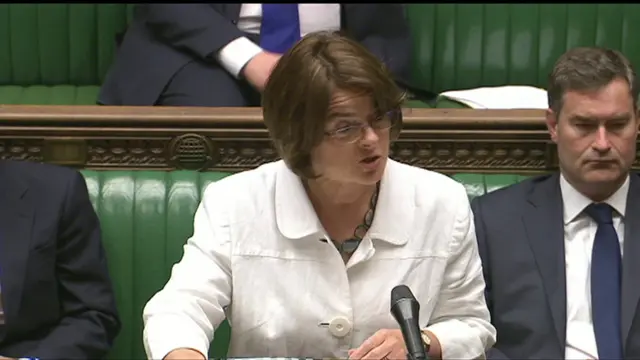
Financial Secretary to the Treasury Jane Ellison replies that Concentrix "were only paid for making the right decisions".
She seeks to assure MPs that the firm were "not allowed to engage in fishing expeditions or pick on vulnerable claimants".
"Despite he best efforts of the workers" Concentrix has "not been providing high levels of service required of its contract" and the contract was cancelled, she says.
HMRC will not be passing new cases to Concentrix and have deployed 150 staff "with immediate effect" to aid any claimants questioning their tax credit decisions.
Concentrix statement
 House of Commons
House of Commons
Parliament
Shadow chief secretary to the Treasury, Rebecca Long-Bailey, has an urgent question on Concentrix, the US firm employed by the government to cut tax credit fraud and overpayment, which has been accused of incorrectly withdrawing tax credits from hundreds of claimants.
HMRC has cancelled its current contract with the firm, which was due to expire in May 2017.
Concentrix won a £75m contract to try to save the government more than £1bn in incorrect or fraudulent tax credit payments in May last year.
Tax credits - the Child Tax Credit and the Working Tax Credit - are government payments made to households on low incomes.
Concentrix said it had operated "within the guidance set by HMRC".
Point of Order
 House of Commons
House of Commons
Parliament
Leader of the House David Lidington gets to his feat to respond to the criticism.
He says it was "right to take time to get cross party support for the changes to select committee chairs".
He adds he has "given instructions immediately for changes to standing order and table those as rapidly as we can".
Speaker statement
 House of Commons
House of Commons
Parliament
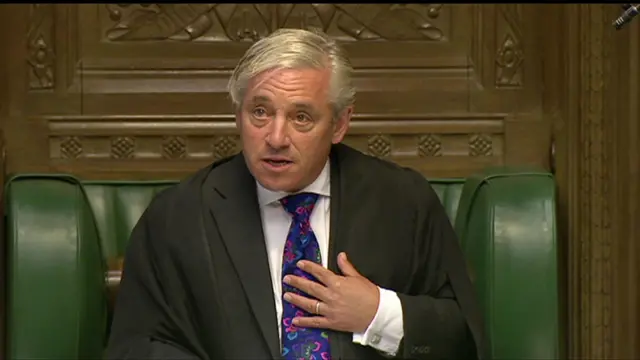
Speaker John Bercow makes a short speech to try and provoke the government into putting forward a "timetable for election of vacant chairs of select committees".
He says it is his understanding that discussions have concluded but the government has yet to move the necessary motions.
"I hope they will be tabled soon," he says, and if so the election of new committee chairs will take place on 19 October.
He admits he is "not being especially subtle", adding he hopes his interventions will mean the motion will be "tabled by tomorrow".
Caroline Flint, ex-Labour minister, agrees with the idea that the grammar schools policy is a diversion tactic, to throw a bit of "red meat" to Leave-backing Tory MPs who she predicts won't be happy with the ultimate Brexit deal.
Damian Green, the work and pensions secretary, defends the grammar schools proposals. "The idea that this is bringing anything back is a central misunderstanding. This is a new system."
In points of order after PMQs Speaker John Bercow says he hopes that the elections to decide who chairs select committees will take place on Wednesday 19 October. There are, of course, vacancies caused by the post-Brexit departmental shake-up and Keith Vaz's resignation as Home Affairs Committee chairman.
The BBC's Laura Kuenssberg says the grammar school proposals are "a major set of reforms on top of a major set of reforms that doesn't have broad and wholehearted support" in the Tory party.
She adds that there's a conspiracy theory doing the rounds as to whether or not the policy was designed to divert attention away from Brexit, "but she believes in this (policy)".
 Reality Check
Reality Check
Theresa May says that Jeremy Corbyn has got his facts wrong on schools, saying: "We have more teachers in our schools today than in 2010. We have more teachers joining the profession than leaving it. We have fewer pupils in super-sized classes than there have been previously.”
The first two claims are confirmed by the first two graphics in this report, external.
But that report goes on to say that since 2011 the number of pupils per teacher has risen slightly.
The claim about super-sized classes is a bit vague so it is not clear which years we should be comparing.
According to this report from the House of Commons Library, external, the proportion of primary school pupils in England in large classes peaked at nearly 35% in 1998 before declining sharply to 18% in 2002 and declining gradually until 2011. Since then it has slightly increased.
In the secondary sector the trend was upwards during most of the 1990s. The proportion of pupils in large class sizes rose from below 9% in 1997 to nearly 12% in 2004 before falling to below 10% from 2013 to 2015.
Allow X content?
This article contains content provided by X. We ask for your permission before anything is loaded, as they may be using cookies and other technologies. You may want to read X’s cookie policy, external and privacy policy, external before accepting. To view this content choose ‘accept and continue’.
Allow X content?
This article contains content provided by X. We ask for your permission before anything is loaded, as they may be using cookies and other technologies. You may want to read X’s cookie policy, external and privacy policy, external before accepting. To view this content choose ‘accept and continue’.
Analysing PMQs, BBC political editor Laura Kuenssberg says grammar schools is a hugely risky and complex policy for the government. She says Mrs May's "big problem" in getting it through the Commons is that Labour is "united" on the policy and the Tories are split.
"I think she was really struggling there to actually defend the policy and to give a clear narrative," Laura adds.